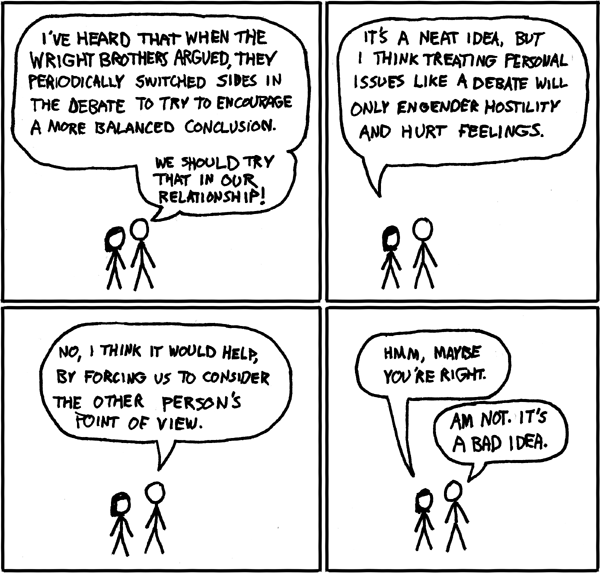106: Wright Brothers
| Wright Brothers |
 Title text: I'm not sure if this is actually true. |
Explanation[edit]
The Wright brothers are Orville and Wilbur Wright, who are credited with the invention of the airplane and the first "controlled, powered, and sustained heavier-than-air human flight" in 1903.
Cueball mentions to Megan that the Wright Brothers would sometimes argue each other's point during debates in order to "encourage a more balanced debate" – presumably so both brothers would explore all of the arguments on both sides. Megan is initially against the idea, stating that treating emotionally-charged personal issues as if they were academic debates would not work. Cueball argues that it would force each person to consider the other's point of view. However, when Megan reconsiders, accepts his argument, and appears to agree that they should try it, Cueball abruptly switches his position to thinking that it's a terrible idea. The joke is that once Megan agrees with him, he employs his Wright Brothers suggestion and takes her initial position that the idea was bad. Thus, the two have switched their arguments and are now exploring the other sides. They may continue in this way to form a well balanced conclusion on the proposal or continually switch sides without ever concluding the argument.
The title text suggests that Randall may either be misremembering the fact that the Wright brothers used this technique, or not be convinced that the source is reliable, but has decided to assume it is true just so that he could make the joke in this comic.
Transcript[edit]
- [Cueball and Megan are talking to each other.]
- Cueball: I've heard that when the Wright brothers argued, they periodically switched sides in the debate to try to encourage a more balanced conclusion.
- Cueball: We should try that in our relationship!
- Megan: It's a neat idea, but I think treating personal issues like a debate will only engender hostility and hurt feelings.
- Cueball: No, I think it would help, by forcing us to consider the other person's point of view.
- Megan: Hmm, maybe you're right.
- Cueball: Am not. It's a bad idea.
Discussion
The issue date is definitely not correct, because the file doesn't have a create-date. Anyone? --Rikthoff (talk) 06:30, 3 August 2012 (UTC)
- Fixed. Date from Archive page is May 24, 2006. -- -- Bpothier (talk) 20:21, 28 September 2012 (UTC) (please sign your comments with ~~~~)
This reminds me of Doctor Who: "The key to a fair compromise is not knowing which side you're on." In this case, however, the humans and zygons actually have their memories erased. 108.162.219.202 (talk) (please sign your comments with ~~~~)
I guess the title text is more a joke on his previously often used sentence "It's true, do this all the time" or similar but now switched sides 108.162.254.75 18:50, 28 January 2015 (UTC)
"Often, after an hour or so of heated argument, we would discover that we were as far from agreement as when we started, but that each had changed to the other’s original position." Orville Wright (1912). Although it was not a deliberate change of position as depicted in the comic, the outcome reaches the same point. --Igwarrender (talk) 16:03, 10 November 2015 (UTC)
This really would work in interpersonal relationships, especially for the large proportion of people who lack the qualities necessary to be considering the other person's sincerely held belief as a matter of course. -Kazvorpal (talk) 21:30, 19 September 2019 (UTC)
https://www.rightattitudes.com/2012/02/15/argue-like-the-wright-brothers and https://www.uh.edu/engines/epi927.htm come up on web search 162.158.62.13 16:24, 6 April 2021 (UTC)